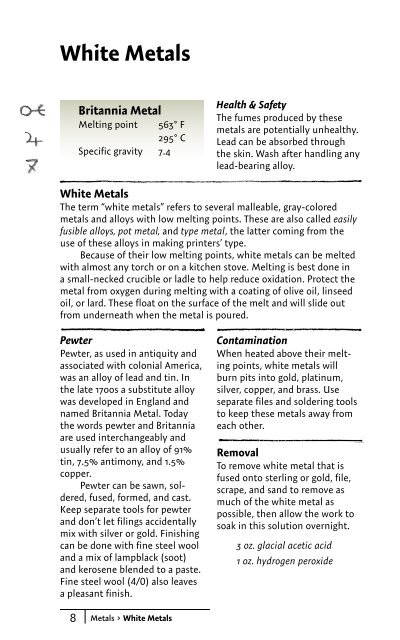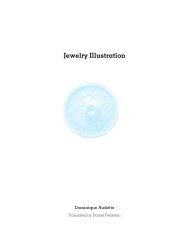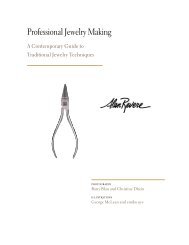complete metalsmith - Brynmorgen Press
complete metalsmith - Brynmorgen Press
complete metalsmith - Brynmorgen Press
You also want an ePaper? Increase the reach of your titles
YUMPU automatically turns print PDFs into web optimized ePapers that Google loves.
White Metals<br />
Britannia Metal<br />
Melting point 563° F<br />
295° C<br />
Specific gravity 7.4<br />
8 Metals > White Metals<br />
Health & Safety<br />
The fumes produced by these<br />
metals are potentially unhealthy.<br />
Lead can be absorbed through<br />
the skin. Wash after handling any<br />
lead-bearing alloy.<br />
White Metals<br />
The term “white metals” refers to several malleable, gray-colored<br />
metals and alloys with low melting points. These are also called easily<br />
fusible alloys, pot metal, and type metal, the latter coming from the<br />
use of these alloys in making printers’ type.<br />
Because of their low melting points, white metals can be melted<br />
with almost any torch or on a kitchen stove. Melting is best done in<br />
a small-necked crucible or ladle to help reduce oxidation. Protect the<br />
metal from oxygen during melting with a coating of olive oil, linseed<br />
oil, or lard. These float on the surface of the melt and will slide out<br />
from underneath when the metal is poured.<br />
Pewter<br />
Pewter, as used in antiquity and<br />
associated with colonial America,<br />
was an alloy of lead and tin. In<br />
the late 1700s a substitute alloy<br />
was developed in England and<br />
named Britannia Metal. Today<br />
the words pewter and Britannia<br />
are used interchangeably and<br />
usually refer to an alloy of 91%<br />
tin, 7.5% antimony, and 1.5%<br />
copper.<br />
Pewter can be sawn, soldered,<br />
fused, formed, and cast.<br />
Keep separate tools for pewter<br />
and don’t let filings accidentally<br />
mix with silver or gold. Finishing<br />
can be done with fine steel wool<br />
and a mix of lampblack (soot)<br />
and kerosene blended to a paste.<br />
Fine steel wool (4/0) also leaves<br />
a pleasant finish.<br />
Contamination<br />
When heated above their melting<br />
points, white metals will<br />
burn pits into gold, platinum,<br />
silver, copper, and brass. Use<br />
separate files and soldering tools<br />
to keep these metals away from<br />
each other.<br />
Removal<br />
To remove white metal that is<br />
fused onto sterling or gold, file,<br />
scrape, and sand to remove as<br />
much of the white metal as<br />
possible, then allow the work to<br />
soak in this solution overnight.<br />
3 oz. glacial acetic acid<br />
1 oz. hydrogen peroxide




